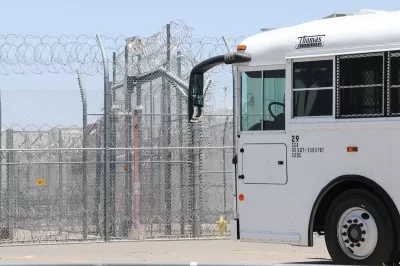People with criminal convictions are 10 times as likely to become homeless as others. Small policy shifts could change that.

A podcast episode from Next City explains how changes in local laws could help prevent people with criminal convictions from becoming homeless.
For a long time, the Department of Housing and Urban Development (HUD) has contributed to the problem by giving each local public housing authority (PHA) room to discriminate against people with convictions. In 2016, the agency published a memo clarifying that PHAs couldn’t have blanket prohibitions on all criminal offenses and providing screening criteria.
However, discrimination at public housing authorities still occurs, prompting HUD to issue a proposal this year that would bar PHAs from “categorically denying apartments because of criminal convictions.”
The episode goes into detail about how the housing crisis particularly affects people with convictions, who are almost 10 times as likely to experience homelessness than the general public. According to the Prison Policy Initiative, “Local PHAs can — and do — exercise a great deal of discretion when crafting and implementing their policies that determine who is and isn’t eligible for low-income public housing. While HUD provides guidelines on criteria for access and denial (24 CFR §982.553), individual PHAs often make their policies even more restrictive than the HUD recommendations.”
FULL STORY: We Can Just Decide Not To Evict People With Convictions From Public Housing

Planetizen Federal Action Tracker
A weekly monitor of how Trump’s orders and actions are impacting planners and planning in America.

Congressman Proposes Bill to Rename DC Metro “Trump Train”
The Make Autorail Great Again Act would withhold federal funding to the system until the Washington Metropolitan Area Transit Authority (WMATA), rebrands as the Washington Metropolitan Authority for Greater Access (WMAGA).

The Simple Legislative Tool Transforming Vacant Downtowns
In California, Michigan and Georgia, an easy win is bringing dollars — and delight — back to city centers.

The States Losing Rural Delivery Rooms at an Alarming Pace
In some states, as few as 9% of rural hospitals still deliver babies. As a result, rising pre-term births, no adequate pre-term care and harrowing close calls are a growing reality.

The Small South Asian Republic Going all in on EVs
Thanks to one simple policy change less than five years ago, 65% of new cars in this Himalayan country are now electric.

DC Backpedals on Bike Lane Protection, Swaps Barriers for Paint
Citing aesthetic concerns, the city is removing the concrete barriers and flexposts that once separated Arizona Avenue cyclists from motor vehicles.
Urban Design for Planners 1: Software Tools
This six-course series explores essential urban design concepts using open source software and equips planners with the tools they need to participate fully in the urban design process.
Planning for Universal Design
Learn the tools for implementing Universal Design in planning regulations.
Smith Gee Studio
City of Charlotte
City of Camden Redevelopment Agency
City of Astoria
Transportation Research & Education Center (TREC) at Portland State University
US High Speed Rail Association
City of Camden Redevelopment Agency
Municipality of Princeton (NJ)




























